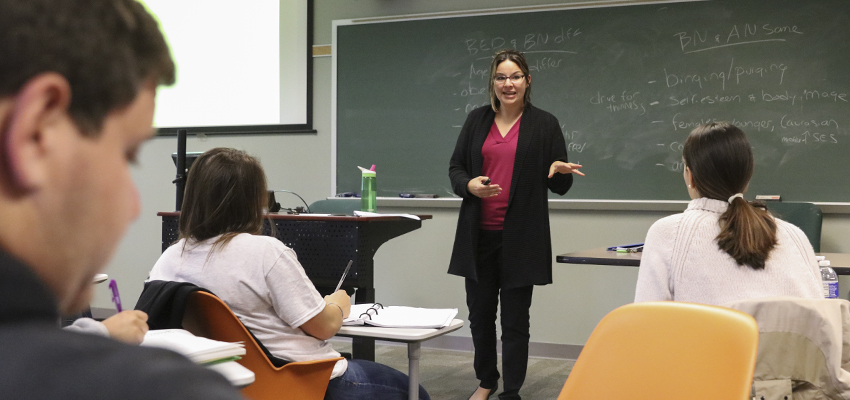
HWS News
23 September 2020 • Faculty • Research Bodenlos and Students Publish on Cognitive Fusion
Cognitive fusion, which occurs when we equate our thoughts with reality, is the topic of an article in the Journal of Contextual Behavioral Science by Associate Professor of Psychological Science Jamie Bodenlos and three of her former students: Elizabeth Hawes '19, Sarah Burstein '19 and Kelsey Arroyo '18. The article, titled Association of Cognitive Fusion With Domains of Health, will appear in the October 2020 issue.
"We experience cognitive fusion when we think something and immediately assume that it is the truth," says Bodenlos. "It's this idea that we look at our thoughts as being the reality," she says. "So, for example, if I have the thought, I am depressed then I do become depressed it moves past just having thoughts about depression."
The study focused on a single population, young adults attending college, and included surveys from 353 HWS undergraduates to examine how cognitive fusion was related to the various domains of health and how it is associated with emotional and physical well-being. The surveys also looked at dispositional mindfulness, the state of being in the moment, and how it related to the other factors being studied.
"This is one of the first studies that looked at cognitive function with mindfulness and the different types of health in college students," Bodenlos says. "We're finding that cognitive fusion plays a more important role in health and well-being than does mindfulness, which is interesting, because those two things are tied together."
Bodenlos thinks it would be worthwhile to explore the mechanisms of how mindfulness works through cognitive fusion, and how being able to defuse your thoughts from actual experiences might relate to the ability to be living in the moment for college students.
Due to the COVID pandemic, she is currently waiting to be able to implement a grant she has received to further study cognitive fusion and health, possibly with an older population. "[I'd like to] work through an older, middle- to lower-income population, looking at whether cognitive diffusion is what mediates the relationship between mindfulness and health," she says.
"The research for the article was accomplished several years ago," says Bodenlos, "and the three students assisted in formulating the research question, analyzing the data and writing the manuscript."
Currently, Hawes is a research assistant at the Medical University of South Carolina, Burstein is a psychometrician in a neuropsychology clinic at Massachusetts General Hospital, and Arroyo is in a doctoral program at the University of Florida. "These three were just really outstanding to work with," says Bodenlos.
